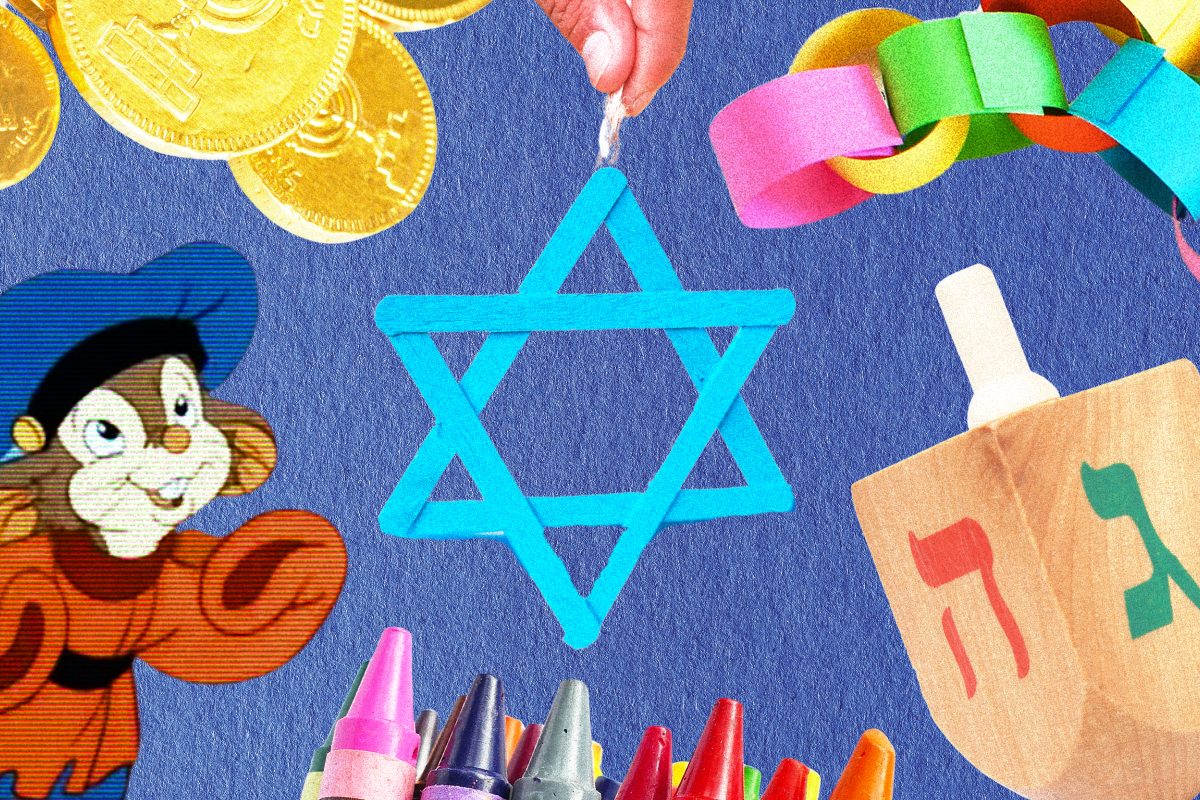At my synagogue’s Hanukkah party last year, there were dreidels on all of the tables to keep kids occupied until the food was served. I idly picked one up and started spinning it, apparently halfway decently, because the man next to me said: “Oh, you must have done that a lot when you were a kid!”
Actually, I hadn’t — I was raised Christian and converted to Judaism in my 30s. I’ve felt welcomed and accepted by my in-person and online Jewish communities, but I also feel a tinge of sadness whenever people talk about their childhood experiences with Judaism. The more I delved into Judaism the more it felt like the things I’d missed out on kept racking up. I didn’t attend Jewish summer camp. I’ve never searched for the afikomen. I didn’t grow up folding hamantaschen or braiding challah. I had a Catholic confirmation ceremony instead of a bat mitzvah.
But that comment about my dreidel skills gave me a flash of inspiration instead of my usual melancholic spiral. I realized that instead of fixating on all of the things I had missed out on, I could give myself the Jewish childhood I never had, dreidel-spinning and all. I spent the remainder of the Hanukkah party rolling beeswax candles (the fellow adults at my table initially looked on skeptically, but eventually joined in) and my completed Hanukkah coloring page occupied a place of honor on my refrigerator for the rest of the holiday.
When Purim rolled around, I used it as an opportunity to watch VeggieTales’ “Esther, the Girl Who Became Queen.” I read picture books based on Yiddish folktales and developed a deep fondness for the mice under the floorboards in “Something from Nothing.” I rewatched “An American Tale” with a new perspective — 5-year-old me, growing up Catholic in northern Minnesota, didn’t understand that Fievel Mousekewitz was Jewish and the movie was based on the very real history of Eastern European Jews who immigrated to New York City to escape persecution, but grown-up me sure did.
The more I delved into my Jewish-childhood-in-my-30s project, the more my attitude shifted. In the lead up to Rosh Hashanah, someone asked me if I was familiar with the kids’ song about dipping the apple in the honey. I wasn’t, but instead of feeling disheartened, I was excited to look it up on YouTube and incorporate it into my holiday celebration.
I live in a townhome without a yard, and when my initial scheme to build a sukkah on my patio didn’t pan out, I pivoted to building a tiny edible sukkah on my kitchen table. I mixed up a batch of icing to attach graham crackers together to form walls. The roof — dense enough to provide shade, but with spaces to see the stars — was made out of pretzel sticks.
My husband wandered over as I was in the midst of decorating my sukkah by adhering mini M&Ms to the graham cracker walls. “You’re really enjoying this,” he observed.
I really was — not just the act of building my tiny graham cracker sukkah, but my entire experience of creating a Jewish childhood for myself in my 30s. Experiencing a religion for the first time as an adult is a profoundly different experience than being raised in it since birth. When I converted, I jumped straight into the deep end of the pool: attending classes, studying Jewish theology and history and thinking about geopolitics. There were the practical to-dos, from hanging up a mezuzah to updating my healthcare directive to reflect that I wanted a Jewish burial. I had to cultivate a Jewish community, a daunting task for an introvert. There was a new vocabulary, a new calendar, new holidays, new foods, new traditions, new pop culture references — all at once.
Obviously, I found a great deal of meaning and fulfillment in the conversion process, overwhelming as it felt at times. But I got so caught up in the logistics of being Jewish that I missed out on something important: Joy.
I have a 5-year-old niece and a 2-year-old nephew, and one of the best parts of being an aunt is seeing how exciting everything is to them. Eating doughnuts, zooming down a slide, wearing matching pajamas — simple things that adults take for granted are sources of sheer delight to young kids. They’re not weighed down by anxiety about paying the bills or the state of the world, and they’re not worried about impressing people. That’s what my Jewish childhood at age 37 gives me: the ability to be present in the moment, without stressing out about my lousy Hebrew pronunciation. The Jewish experiences of adulthood — reading, studying, attending services, contributing to the community, upholding traditions — are important. But the Jewish experiences of childhood, the crafts and the picture books and the animated movies, are important, too.
This year, I’m planning to host my own Hanukkah party. There will be a couple of children in attendance, but the dreidels, make-your-own beeswax candle kit and whatever additional kid-friendly activities I come up with won’t just be for them. Everyone deserves a dose of childlike Jewish joy.



